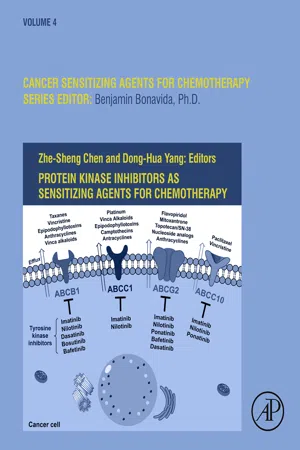
Protein Kinase Inhibitors as Sensitizing Agents for Chemotherapy
Benjamin Bonavida
- 292 páginas
- English
- ePUB (apto para móviles)
- Disponible en iOS y Android
Protein Kinase Inhibitors as Sensitizing Agents for Chemotherapy
Benjamin Bonavida
Información del libro
Tyrosine Kinase Inhibitors as Sensitizing Agents for Chemotherapy, the fourth volume in the Cancer Sensitizing Agents for Chemotherapy Series, focuses on strategic combination therapies that involve a variety of tyrosine kinase inhibitors working together to overcome multi-drug resistance in cancer cells. The book discusses several tyrosine kinase inhibitors that have been used as sensitizing agents, such as EGFR, BCR-ABL, ALK and BRAF. In each chapter, readers will find comprehensive knowledge on the inhibitor and its action, including its biochemical, genetic, and molecular mechanisms' emphases. This book is a valuable source for oncologists, cancer researchers and those interested in applying new sensitizing agents to their research in clinical practice and in trials.
- Summarizes the sensitizing role of some tyrosine kinase inhibitors in existing research
- Brings recent findings in several cancer types, both experimental and clinically, with a particular emphases on underlying biochemical, genetic, and molecular mechanisms
- Provides an updated and comprehensive knowledge regarding the field of combinational cancer treatment
Preguntas frecuentes
Información
EGFR and HER2 Inhibitors as Sensitizing Agents for Cancer Chemotherapy
Abstract
Keywords
Acknowledgments
Conflict of Interest
Introduction
Tyrosine Kinases: Targeting the EGFR and HER2 Receptors
Resistance to Chemotherapy

EGFR and HER2 Inhibitors as Sensitizing Agents to Chemotherapy
Gefitinib
Índice
- Cover image
- Title page
- Table of Contents
- Copyright
- Contributors
- About the Editors
- About the Series Editor
- Aims and Scope for Series “Cancer Sensitizing Agents for Chemotherapy”
- Preface
- Chapter 1: EGFR and HER2 Inhibitors as Sensitizing Agents for Cancer Chemotherapy
- Chapter 2: BCR-ABL Inhibitors as Sensitizing Agents for Cancer Chemotherapy
- Chapter 3: VEGFR Inhibitors as Sensitizing Agents for Cancer Chemotherapy
- Chapter 4: ALK Tyrosine Kinase Inhibitors in Drug Sensitization
- Chapter 5: STAT3 Inhibitors as Sensitizing Agents for Cancer Chemotherapy
- Chapter 6: FLT3 Inhibitors as Sensitizing Agents for Cancer Chemotherapy
- Chapter 7: Collagen Signaling in Cancer
- Chapter 8: Bruton's Tyrosine Kinase (BTK) Inhibitors as Sensitizing Agents for Cancer Chemotherapy
- Chapter 9: CDK Inhibitors as Sensitizing Agents for Cancer Chemotherapy
- Chapter 10: Bcl-2 Inhibitors as Sensitizing Agents for Cancer Chemotherapy
- Chapter 11: Small Molecule Chemosensitizing Agents: Polo-Like Kinase 1 (Plk1), BRAF and Janus Kinase (JAK) Inhibitors
- Chapter 12: PI3K/AKT Inhibitors as Sensitizing Agents for Cancer Chemotherapy
- Chapter 13: Proteasome Inhibitors as Sensitizing Agents for Cancer Chemotherapy
- Chapter 14: Combining PI3K/Akt/mTOR Inhibition With Chemotherapy
- Chapter 15: MDM2/P53 Inhibitors as Sensitizing Agents for Cancer Chemotherapy
- Index